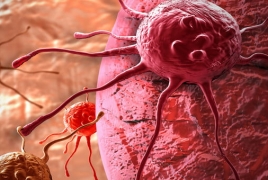Nano-engineered cuttlefish ink found promising for cancer treatment July 24, 2019 - 13:51 AMT PanARMENIAN.Net - Medical technologies produce nanoparticles like photothermal agents, that when irradiated can destroy cancer cells. These synesthetic chemicals are expensive; a new research stream has turned to the humble cuttlefish for an alternative. Scientists from Wuhan University in China have been examining the suitability of natural nanoparticles for cancer treatment, as an easy accessible and lower-cost alternative to more conventional synthetic nanoparticles, Digital Journal. With the research, scientists have been examining nanoparticles extracted from cuttlefish ink to assess their anti-tumor efficacy. These are particles with a spherical morphology, good dispersibility, and biocompatibility. The analysis has revealed the cuttlefish ink particles to be rich in melanin as well as being composed of several types of amino acids and monosaccharides. Further analysis has shown that via the activation of a specific cellular pathway, called the mitogen-activated protein kinase signaling pathway, cuttlefish ink particles can effectively re-program part of the body's own immune defense system - in this case tumor-associated macrophages (white blood cells)- to fight tumours. Experimental data, as Phys.org reports, shows that cuttlefish ink particles possess levels of under near-infrared (NIR) irradiation and a high photothermal effect (phenomenon associated with electromagnetic radiation), which combine to make an effective tumor cell killing ability. Longer-term, this means cuttlefish ink particles are a potential candidate for photothermal therapy of tumors. This was shown in studies where the application of cuttlefish ink particles triggered reduced primary tumor growth and lung metastasis. The researchers are confident that, when used In combination with the photothermal effect, cuttlefish ink particles can can induce tumor-specific antigens release and almost completely inhibit tumor growth (the in-vitro and later mice experiments of this study demonstrated that irradiated nanoparticles killed approximately 90 percent of the tumor cells). This will require further study, although the research to date shows considerable potential. According to lead researcher Dr. Pang-Hu Zhou: "We found natural nanoparticles from cuttlefish ink with good biocompatibility that can effectively achieve tumor immunotherapy and photothermal therapy simultaneously. This finding might inspire more exploration of natural materials for medical applications." The research has been published in the journal ACS Nano, with the research paper titled "Nanoparticles from Cuttlefish Ink Inhibit Tumor Growth by Synergizing Immunotherapy and Photothermal Therapy." Authorities said a total of 192 Azerbaijani troops were killed and 511 were wounded during Azerbaijan’s offensive. In 2023, the Azerbaijani government will increase the country’s defense budget by more than 1.1 billion manats ($650 million). The bill, published on Monday, is designed to "eliminate the shortcomings of an unreasonably broad interpretation of the key concept of "compatriot". The earthquake caused a temporary blackout, damaged many buildings and closed a number of rural roads. Partner news |